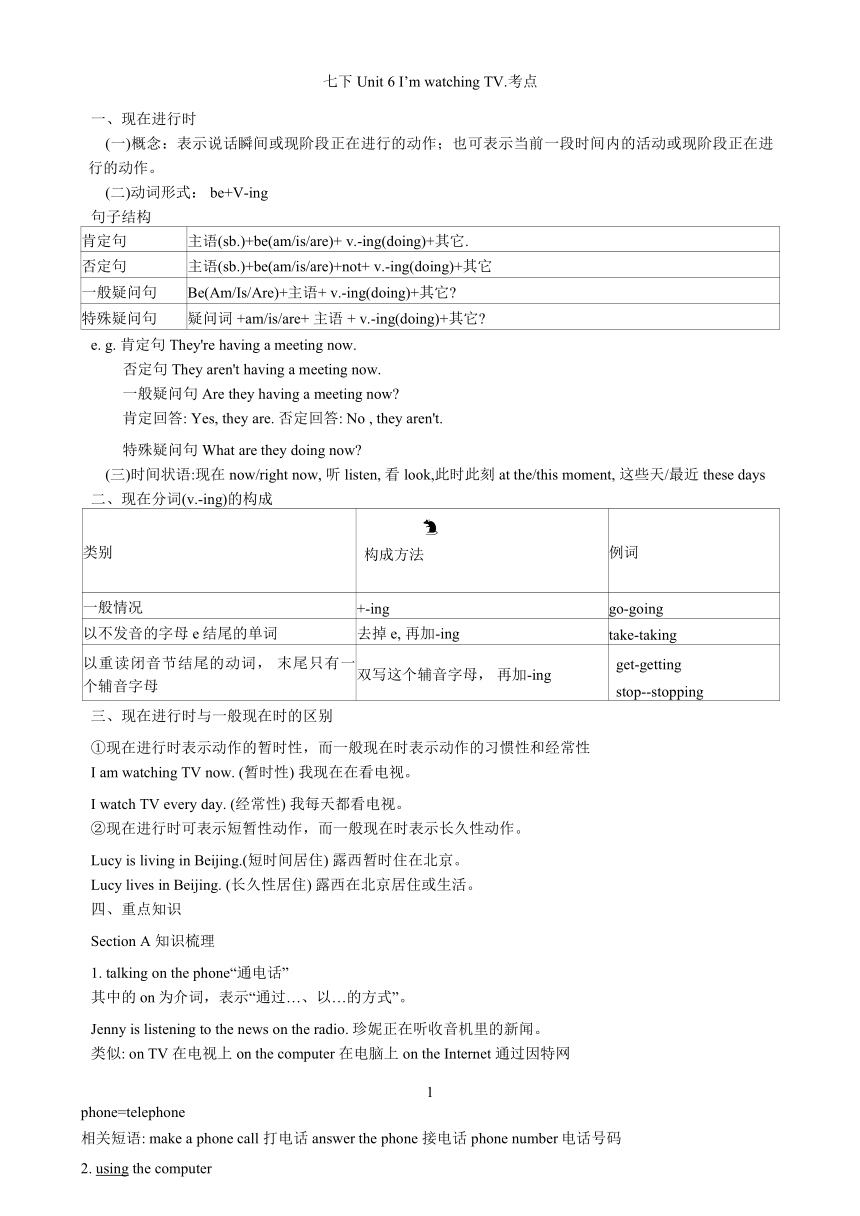
七下 Unit 6 I’m watching TV.考点 一、现在进行时 (一)概念:表示说话瞬间或现阶段正在进行的动作;也可表示当前一段时间内的活动或现阶段正在进行的动作。 (二)动词形式: be+V-ing 句子结构 肯定句 主语(sb.)+be(am/is/are)+ v.-ing(doing)+其它. 否定句 主语(sb.)+be(am/is/are)+not+ v.-ing(doing)+其它 一般疑问句 Be(Am/Is/Are)+主语+ v.-ing(doing)+其它 特殊疑问句 疑问词 +am/is/are+ 主语 + v.-ing(doing)+其它 e. g. 肯定句 They're having a meeting now. 否定句 They aren't having a meeting now. 一般疑问句 Are they having a meeting now 肯定回答: Yes, they are. 否定回答: No , they aren't. 特殊疑问句What are they doing now (三)时间状语:现在now/right now, 听 listen, 看 look,此时此刻 at the/this moment, 这些天/最近these days 二、现在分词(v.-ing)的构成 类别 构成方法 例词 一般情况 +-ing go-going 以不发音的字母e结尾的单词 去掉e, 再加-ing take-taking 以重读闭音节结尾的动词, 末尾只有一个辅音字母 双写这个辅音字母, 再加-ing get-getting stop--stopping 三、现在进行时与一般现在时的区别 ①现在进行时表示动作的暂时性,而一般现在时表示动作的习惯性和经常性 I am watching TV now. (暂时性) 我现在在看电视。 I watch TV every day. (经常性) 我每天都看电视。 ②现在进行时可表示短暂性动作,而一般现在时表示长久性动作。 Lucy is living in Beijing.(短时间居住) 露西暂时住在北京。 Lucy lives in Beijing. (长久性居住) 露西在北京居住或生活。 四、重点知识 Section A 知识梳理 1. talking on the phone“通电话” 其中的 on为介词,表示“通过…、以…的方式”。 Jenny is listening to the news on the radio. 珍妮正在听收音机里的新闻。 类似: on TV 在电视上 on the computer 在电脑上 on the Internet 通过因特网 1 phone=telephone 相关短语: make a phone call 打电话 answer the phone 接电话 phone number电话号码 2. using the computer use 此处用作及物动词,意为“使用、运用” use sth. to do sth.“用某物做某事”。 =use sth. for(doing) sth. I use a knife to cut bread.=I use a knife for cutting bread. 我用刀切面包。 相关词: useful adj.有用的 useless adj.无用的 3. This is Jenny. 这是打电话的常用语, =This is Jenny speaking, 一般用 this 表示“我”, that表示“你”。 --Is that Tom speaking --No, this is Tom's father. 你是汤姆吗 ———不, 我是汤姆的父亲。 4. I'm just washing my clothes. just此处用作副词,意为“只是、恰好”。 I just want to talk to you. 我只是想和你谈谈。It's just two o'clock. 现在才两点钟。 相关短语: just now 刚才 just then 就在那时 5. Do you want to join me for dinner ①join+组织/团体,表示“加入到某个组织中并成为其中一员”。 He joined the army in 1990. Nowadays more and more people join the swimming club to build their bodies. ②join+sb.(in sth.)表示“加入到某些人当中去”。 Would you like to join us in the computer game ③join in 表示参加某种活动, 相当于 take part in。 College students join in many activities after class. 6. I’d like to. I'd like to.=I'd like to. 表示有礼貌地接受他人的邀请。 I'd=I would --Would you like to play football with me 你愿意和我一起踢足球吗 --Yes, I'd love/like to. 好的, 我很乐意。 当委婉拒绝别人的邀请时, 多用I'd like to, but...或者 Sorry, I'm afraid I can't because...等。 --Would you like t ... ...
~~ 您好,已阅读到文档的结尾了 ~~

